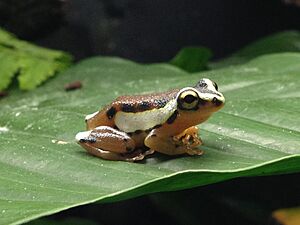Hyperolius mitchelli facts for kids
Quick facts for kids Hyperolius mitchelli |
|
|---|---|
 |
|
| Conservation status | |
| Scientific classification | |
| Synonyms | |
|
Hyperolius puncticulatus mitchelli Loveridge, 1953 |
The Mitchell's reed frog (scientific name: Hyperolius mitchelli) is a type of frog. It belongs to the Hyperoliidae family, also known as the 'reed frogs'. You can find this frog in parts of eastern Africa. It lives in northeastern Tanzania (including Zanzibar), Malawi, and central Mozambique.
Contents
About the Mitchell's Reed Frog
How it Got its Name
The Mitchell's reed frog was named after a naturalist named Mr. Bernard Lindley Mitchell. He worked for the Nyasaland Game and Tsetse Department. Mr. Mitchell helped the scientist Arthur Loveridge a lot. He provided information about the amphibians in the area. Loveridge named this frog, and also Mitchell's flat lizard, after him.
What Does it Look Like?
Mitchell's reed frogs are small. Male frogs are usually about 23 to 27 millimeters long. Female frogs are a bit bigger, from 25 to 32 millimeters long. That's about the size of a small paperclip!
These frogs have two main color patterns, called "phases."
- Phase J: Young frogs and many adult males have this look. Their backs are brownish with some darker, blurry spots.
- Phase F: Adult females and some adult males show this pattern. Their backs are darker brown, or sometimes lighter brown with blurry spots. They also have cool silver lines with black edges. These lines run from their snout to their sides.
No matter the phase, the belly of the Mitchell's reed frog is yellow to orange.
Where Mitchell's Reed Frogs Live
Habitat and Environment
Mitchell's reed frogs live in different kinds of places. They like dry forests and areas with lots of bushes. They can also be found on farms where there isn't too much farming activity. These frogs live from lowlands up to about 1,200 meters (almost 4,000 feet) above sea level.
Reproduction and Life Cycle
When it's time to lay eggs, these frogs go to ponds. They use both permanent ponds and temporary ones that might dry up later. They prefer ponds in open forests or bushy farm areas. A female frog can lay between 50 and 100 eggs. She lays them on plants that are growing over the water.
Conservation Status
Good news! The Mitchell's reed frog is quite common. It can even live in places where humans have changed the land a bit. Because of this, scientists do not think this frog is in danger of disappearing.


